|
Kick Assiest Blog
Monday, 18 June 2007
France
Mood:
 bright
Topic: News bright
Topic: News
French conservatives win parliamentary majority  PARIS -- The conservative party of French President Nicolas Sarkozy has won a clear parliamentary majority in elections. That's seen as crucial to his vision for opening up the French economy. PARIS -- The conservative party of French President Nicolas Sarkozy has won a clear parliamentary majority in elections. That's seen as crucial to his vision for opening up the French economy.
Sarkozy's Union for a Popular Movement will face little resistance to the rash of measures he plans to introduce within weeks to make France's sluggish economy more competitive and less protective. But today's legislative runoff suggests that voters in France also wanted to send the hard-driving, U-S-friendly president a message that his powers are not absolute. Sarkozy's party and its allies won 346 of the 577 seats in the National Assembly, which was fewer than the 359 seats the U-M-P used to have. Led by the Socialists, the opposition left took a better-than-expected 226 seats -- a considerable improvement over their 149 in the last parliament. KGAN.com ~ CBS 2 News - Assoc Press ** French conservatives win parliamentary majority
Posted by yaahoo_
at 2:46 AM EDT
Updated: Tuesday, 19 June 2007 2:20 AM EDT
Thursday, 14 June 2007
Iraq
Mood:
 celebratory
Topic: News celebratory
Topic: News
 Al-Qaeda military emir of Mosul killed in Iraq Al-Qaeda military emir of Mosul killed in Iraq
 BAGHDAD, Iraq -- Coalition Forces killed a senior terrorist leader during an operation Tuesday morning targeting the al-Qaeda in Iraq network in Mosul. BAGHDAD, Iraq -- Coalition Forces killed a senior terrorist leader during an operation Tuesday morning targeting the al-Qaeda in Iraq network in Mosul.
Kamal Jalil Bakr ‘Uthman, also known as Sa’id Hamza, was known to be the al-Qaeda in IraqMosul. Intelligence reports indicate he planned, coordinated and facilitated suicide bombings in the Mosul area. Additionally, he facilitated the movement of more than 100 foreign fighters through safe houses in the area, and orchestrated attacks against Iraqi and Coalition Forces. Coalition Forces targeted ‘Uthman Tuesday as part of their operations to disrupt the al-Qaeda in Iraq Mosul. As they entered his residence, ‘Uthman rushed into another room and reached under a mattress. Coalition Forces, reacting appropriately to the hostile threat, engaged ‘Uthman, killing him. The ground force later found a suicide vest under the mattress. Coalition Forces had detained ‘Uthman during an operation in August 2006. He was released from the Iraqi judicial system in April 2007, and intelligence reports indicate he was planning a six-vehicle suicide bomb attack to avenge his detention.  “We have taken another very dangerous terrorist off the streets of Iraq, and we will continue to deplete the senior leadership of al-Qaeda in Iraq,” said Lt. Col. Christopher Garver, MNF-I spokesperson. “We have taken another very dangerous terrorist off the streets of Iraq, and we will continue to deplete the senior leadership of al-Qaeda in Iraq,” said Lt. Col. Christopher Garver, MNF-I spokesperson.
Multi-National Force - Baghdad, Iraq ~ Combined Press Information Center **
Al-Qaeda military emir of Mosul killed
Posted by yaahoo_
at 3:35 AM EDT
Wednesday, 13 June 2007
Deficit
Mood:
 party time!
Now Playing: BUSH'S FAULT
Topic: News party time!
Now Playing: BUSH'S FAULT
Topic: News
Federal Deficit Sharply Lower 
 WASHINGTON -- The federal deficit is running sharply lower through the first eight months of this budget year as growth in revenues continues to outpace the growth in spending. WASHINGTON -- The federal deficit is running sharply lower through the first eight months of this budget year as growth in revenues continues to outpace the growth in spending. The Treasury Department said that the deficit through May totaled $148.5 billion, down 34.6 percent from the same period a year ago. That improvement came even though the deficit in May increased to $67.7 billion, up 57.8 percent from May 2006. However, analysts attributed this big increase to the fact that the Internal Revenue Service was more efficient in processing tax returns this year, meaning more revenue was collected in April with fewer tax collections left to be counted in May.  For the year, revenue and spending are both at record levels. Revenue gains are up 8 percent while outlays are up at a slower pace of 2.5 percent, compared to the same period a year ago. Growth in spending has been slower this year in part because of the absence of last year's huge outlays for hurricane relief. For the year, revenue and spending are both at record levels. Revenue gains are up 8 percent while outlays are up at a slower pace of 2.5 percent, compared to the same period a year ago. Growth in spending has been slower this year in part because of the absence of last year's huge outlays for hurricane relief.
 The increase in revenues has been supported by continued strength in corporate profits and low unemployment, which has helped to push individual income taxes higher. The increase in revenues has been supported by continued strength in corporate profits and low unemployment, which has helped to push individual income taxes higher.
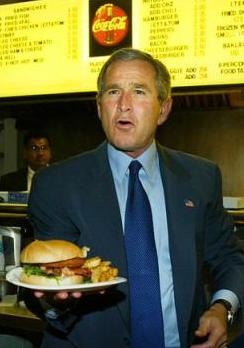 For the 2007 budget year, which ends on Sept. 30, the Congressional Budget Office is projecting a federal deficit of $177 billion. That would be down 28.7 percent from last year's imbalance of $248.2 billion, which had been the lowest deficit in four years. For the 2007 budget year, which ends on Sept. 30, the Congressional Budget Office is projecting a federal deficit of $177 billion. That would be down 28.7 percent from last year's imbalance of $248.2 billion, which had been the lowest deficit in four years.
The federal budget was in surplus for four years from 1998 through 2001 as the long economic expansion helped push revenues higher. In the budget President Bush sent Congress in February for 2008, he projected that the government can return to a surplus by 2012 even if his first-term tax cuts are made permanent. Democratic critics, however, contend that Bush's spending blueprint was based on unrealistic assumptions and left out major spending items such as the full costs of the Iraq war. They also argue that the current improvement in the deficit will be only temporary as the 78 million baby boomers retire, pushing spending on Social Security and Medicare up in coming years. On the Net: Treasury's monthly budget
Breitbart.com ~ Associated Press - Martin Crutsinger ** Federal Deficit Sharply Lower
Related: Bush's Fault ~ BOOM: States Report Cash Surplus
Posted by yaahoo_
at 6:02 AM EDT
Updated: Wednesday, 13 June 2007 10:17 AM EDT
Monday, 11 June 2007
Boom
Mood:
 cheeky
Now Playing: BUSH'S FAULT
Topic: News cheeky
Now Playing: BUSH'S FAULT
Topic: News
 BOOM: States Report Cash Surplus... BOOM: States Report Cash Surplus... States Finding Fiscal Surprise: A Cash Surplus 
State lawmakers across the country, their coffers unexpectedly full of cash, have been handing out tax cuts, spending money on fixing roads, schools and public buildings, and socking something away for less fruitful years. Budget surpluses have largely stemmed from higher than expected tax collections — corporate tax revenues alone were 11 percent higher than budget estimates — and booming local economies. There has also been some relief in Medicaid spending, which fell from an 11 percent annual growth rate to something closer to 7 percent in the past few years. More than 40 states have found themselves with more money than they planned as they wound down their regular sessions. Governors in 23 of those states proposed tax cuts, and a majority of states with surpluses chose to shore up their roads, schools and rainy day funds. For example, lawmakers in Utah agreed to a $1 billion bond act to fix state roads and add lane miles, while in Idaho state spending on education outpaced that on Medicaid for the first time in 20 years. The extra cash over the last two budget sessions (many states work on a two-year cycle) is at the highest level since 2000, state budget experts say. States, burned by several years of shortfalls, kept their estimates of total revenues on the conservative side and are now reaping plenty. “Because states cut back so in the early part of the decade,” said Ray Scheppach, the executive director of the National Governors Association, “they put off maintenance, they put off building, things like that, so they are beginning to do some one-time spending.” Like teenagers who went without allowance, legislators have been working off pent-up demand. Many states are largely using surpluses to tackle long-term and costly problems like the uninsured and crumbling infrastructures. In large part, experts say, states are looking to give relief to taxpayers who have long been howling about property taxes, and to pay back areas that states have been robbing to balance previous budgets. “When states return to a positive balance, they will not normally go back to tax cutting right away,” said Arturo Perez, a fiscal analyst with the National Conference of State Legislatures, which has tracked the spending of states and tabulated the list of those with surpluses. “But there has been across the country a growing interest in addressing the issue of property tax levels and burdens.” Education — especially state universities — has also been long waiting, Mr. Perez said. “In times of difficulty, states tend to look for areas they can make adjustments to, and higher education represents the largest area of discretionary expenditures,” he said. In the New York area, where legislators are still negotiating budgets, the song is much the same. Connecticut, for example, is looking at a $1 billion surplus for its 2007 fiscal year, and New York and New Jersey are mulling billion-dollar property tax breaks and large increases to the public education budget. In about half a dozen state governments, the transfer of power to Democrats after last November’s elections made for a legislative season with more-liberal policymaking, sometimes hand in hand with spending initiatives. Laws extending certain rights to same-sex couples were particularly popular. Most state legislatures have been finishing their business in the past few weeks and months, with about a dozen still in session. Laws vary by state, with some lawmakers working in the state capitals only part-time for a few months every two years, and others employed as full-time legislators who convene every January.  Over all in the 2007 fiscal year, which ends at the end of this month, state spending in the 50 states totaled $616 billion, an increase of about 8.6 percent over 2006, according to a report by the National Governors Association and National Association of State Budget Officers. The average annual growth rate over the past three decades has been 6.5 percent, the report said. Over all in the 2007 fiscal year, which ends at the end of this month, state spending in the 50 states totaled $616 billion, an increase of about 8.6 percent over 2006, according to a report by the National Governors Association and National Association of State Budget Officers. The average annual growth rate over the past three decades has been 6.5 percent, the report said.
Only a handful of states have had to cut budgets, led by Michigan, which has suffered six straight years of job losses. Texas issued the largest property tax cut in its history — $14.2 billion for the biennium, representing roughly a one-third decrease for average home owners.  North Dakota gave homeowners $118.6 million worth of property tax relief, and Utah offered residents a $220 million tax cut package. In Arkansas, the Legislature reduced the state sales tax on groceries from 6 percent to 3 percent and rendered about 81,000 low-incomes families exempt from paying personal income taxes. North Dakota gave homeowners $118.6 million worth of property tax relief, and Utah offered residents a $220 million tax cut package. In Arkansas, the Legislature reduced the state sales tax on groceries from 6 percent to 3 percent and rendered about 81,000 low-incomes families exempt from paying personal income taxes.
Nebraska gave residents $420 million in a host of tax cuts, the largest in that state’s history. “Property tax relief was high on the list of the demands from the citizens,” Mike Flood, speaker of the Legislature, said. On the spending side, money was distributed across the board, but transportation and education saw some of the biggest boosts. Arkansas, for instance, earmarked $80 million from its general fund to repair or expand roads and highways, a result, in some part, of that state’s estimated $313 million in extra net general revenues in fiscal year 2007. In Wyoming, where the $6.9 billion biennium budget for 2007 and 2008 is 23 percent higher than the prior two-year budget, the Legislature sprung for $100 million to improve the state’s highways.  Utah lawmakers agreed to pay for the $1 billion bond act for roads with debt service paid out of the state’s general fund. “We have experienced significant growth here,” said John Massey, Utah’s legislative fiscal analyst. “So it is badly needed.” Utah lawmakers agreed to pay for the $1 billion bond act for roads with debt service paid out of the state’s general fund. “We have experienced significant growth here,” said John Massey, Utah’s legislative fiscal analyst. “So it is badly needed.”
Education has been another legislative priority. Idaho lawmakers increased spending for lower education 5.9 percent and for higher education by 8.4 percent, thanks in part to the $200 million surplus in this year’s budget. “Higher education has a more flexible budget, and basically we have kind of used them as our checkbook,” said Maxine T. Bell, the chairwoman of the state’s appropriations committee. “And you can’t keep doing that. The infrastructure gets behind and they raise fees on the students. So this year we were able to give them a pretty good chunk of money, and it was just simply because the economy was in good shape.” This week, the Louisiana Legislature, which is still in session, set aside a record amount for higher education, said John Carpenter, the director of that state’s joint legislative committee on the budget.  Many states have also taken on the expensive and seemingly intractable problem of covering uninsured residents, particularly children. According to a report from the National Governors Association, two-thirds of the nation’s governors have plans to expand health care in their 2008 fiscal years, largely through expansions of government-financed health insurance programs and employer mandates. Many states have also taken on the expensive and seemingly intractable problem of covering uninsured residents, particularly children. According to a report from the National Governors Association, two-thirds of the nation’s governors have plans to expand health care in their 2008 fiscal years, largely through expansions of government-financed health insurance programs and employer mandates.
For example, Wisconsin is contemplating legislation to cover all of its children by 2010 by expanding programs to those living with family incomes up to 300 percent of the federal poverty level by January 2009 and discounted insurance to those with higher incomes. In Oregon, where legislators are furiously working to wind down the session, lawmakers are deliberating a $60 million increase to a program insuring children via a 84.5 cents-per-pack cigarette tax increase.  “The biggest agenda piece right now is to insure all kids in Oregon,” said Russ Kelley, the spokesman for Oregon’s House speaker, Jeff Merkley. “The biggest agenda piece right now is to insure all kids in Oregon,” said Russ Kelley, the spokesman for Oregon’s House speaker, Jeff Merkley.
The governors association estimated that the national budget for health care expansions in 2008 would be $18.4 billion, including federal allotments. Lawmakers in many states have pushed for rainy day funds: Georgia, Colorado, Nebraska and Oklahoma are among them. “We went into the session with a $400 million rainy day fund, which may have been our largest ever,” said Mike Flood, speaker of the Nebraska Legislature. “Times have been good to Nebraska.”  In Oregon, where Democrats gained control of all of state government for the first time in 16 years, lawmakers passed legislation recognizing domestic partnerships, told insurance companies they had to pay for female as well as male contraception and are in the middle of passing bills restricting predatory lending. In Oregon, where Democrats gained control of all of state government for the first time in 16 years, lawmakers passed legislation recognizing domestic partnerships, told insurance companies they had to pay for female as well as male contraception and are in the middle of passing bills restricting predatory lending.
“It has been 16 years since we have had a major say in things,” Mr. Kelley said, “so we have had some things pile up.” In Colorado, where Democrats gained control of both chambers and the governor’s office for the first time in 45 years, bills were passed to prohibit workplace discrimination based on sexual orientation, ban abstinence-only education and allow gay couples to adopt each other’s children. In Iowa, where Democrats controlled the governor’s office and both houses for the first time in 42 years, the state’s civil rights laws were extended to gays. In Wyoming, at least one law was passed that cost no money, and required no partisanship. Pascopyrum smithii, or western wheatgrass, has now become the state’s official grass. Catherine Billey contributed reporting.
NY Times ~ Jennifer Steinhauer ** States Finding Fiscal Surprise: A Cash Surplus
Related: Bush's Fault ~ Federal Deficit Sharply Lower
Posted by yaahoo_
at 2:57 AM EDT
Updated: Wednesday, 13 June 2007 10:13 AM EDT
Friday, 8 June 2007
Taliban dead
Mood:
 party time!
Topic: News party time!
Topic: News
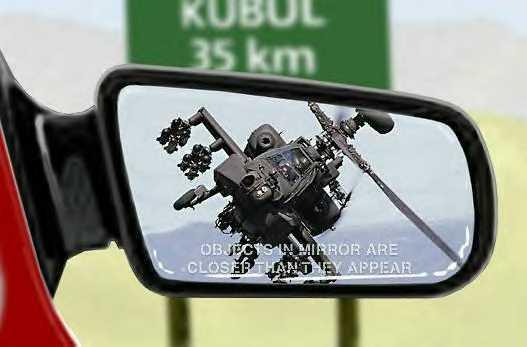
 30 Taliban suspects dead, wounded 30 Taliban suspects dead, wounded
  KABUL, Afghanistan -- Thirty suspected Taliban members were dead or wounded after fighting and airstrikes in southern Afghanistan, the Ministry of Defense said Thursday. KABUL, Afghanistan -- Thirty suspected Taliban members were dead or wounded after fighting and airstrikes in southern Afghanistan, the Ministry of Defense said Thursday.
The battle took place Wednesday in the Garmser district of Helmand province, the world's largest poppy-growing region and site of fierce battles in recent months.  Gen. Mohammad Zahir Azimi, spokesman for the Defense Ministry, said officials could not say how many of the 30 reported casualties were killed or how many wounded. He said multiple sources were used to come up with the figure. Gen. Mohammad Zahir Azimi, spokesman for the Defense Ministry, said officials could not say how many of the 30 reported casualties were killed or how many wounded. He said multiple sources were used to come up with the figure.
Elsewhere, suspected militants attacked a government compound in the southern province of Zabul's Daychopan district Thursday, killing a policeman and wounding three others, said a district police chief, Hakim Khan.   The suspected militants traded heavy machine-gun fire with police and Afghan soldiers for more than two hours, Khan said. The suspected militants traded heavy machine-gun fire with police and Afghan soldiers for more than two hours, Khan said.
One policeman was killed, while two soldiers and a policeman were wounded in the clash before the Taliban withdrew, he said. An Afghan soldier was also killed in a mine explosion in Zabul province, a Defense Ministry statement said.  Meanwhile, in eastern Afghanistan, U.S.-led coalition and Afghan troops killed "an enemy militant" during a firefight in Nangarhar province's Khogyani district, a coalition statement said. Meanwhile, in eastern Afghanistan, U.S.-led coalition and Afghan troops killed "an enemy militant" during a firefight in Nangarhar province's Khogyani district, a coalition statement said.
The troops had been approaching a suspected al-Qaida safehouse when they were fired upon, the statement said.  "Coalition and Afghan forces returned fire, killing the armed militant and quickly securing the scene," it said. "Coalition and Afghan forces returned fire, killing the armed militant and quickly securing the scene," it said.
  The statement said three men were detained, and that troops discovered weapons, timers and grenades -- often used to make improvised explosive devices. The statement said three men were detained, and that troops discovered weapons, timers and grenades -- often used to make improvised explosive devices.
 In Zabul province, coalition and Afghan forces detained three militants early Thursday at another "suspected safehouse for al-Qaida foreign fighters," the coalition said in a statement. Weapons were found on site, and no shots were fired in the operation, it said. In Zabul province, coalition and Afghan forces detained three militants early Thursday at another "suspected safehouse for al-Qaida foreign fighters," the coalition said in a statement. Weapons were found on site, and no shots were fired in the operation, it said.
CNN.com ~ AP ** 30 Taliban suspects dead, wounded
Posted by yaahoo_
at 1:19 AM EDT
Updated: Friday, 8 June 2007 1:31 AM EDT
Thursday, 7 June 2007
Iraqis
Mood:
 chatty
Topic: News chatty
Topic: News
Iraqi People Taking Stand Against Al Qaeda  WASHINGTON -- The Iraqi people are taking a stand against al Qaeda beyond Anbar province, Multinational Force Iraq's new spokesman said today. WASHINGTON -- The Iraqi people are taking a stand against al Qaeda beyond Anbar province, Multinational Force Iraq's new spokesman said today.
Army Brig. Gen. Kevin J. Bergner, who spoke during a phone interview today, called the Iraqis' stance against the terror group the "Anbar Awakening." In the past six months, local tribal leaders and sheikhs in the Sunni province have disavowed the terror group's tactics and have turned to the Iraqi government. Violence in the province has plummeted, and local men are flocking to police and army recruiting stations. Now Iraqis outside Anbar are experiencing their own awakening, Bergner said. In Almariyah, a mixed neighborhood in Baghdad, local Iraqis are turning against al Qaeda following a series of horrendous attacks against local sheikhs and civilians there. "The locals standing up against al Qaeda and separating themselves from them," he said. 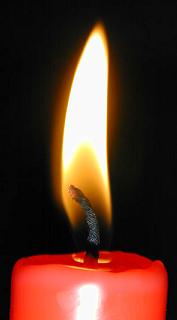 Bergner said Iraqi government and coalition officials are encouraged by the trend. Bergner said Iraqi government and coalition officials are encouraged by the trend.
However, the general warned against jumping to conclusions or making premature assessments of the Baghdad security plan. "We're still positioning the forces committed to Baghdad," he said. Four of the five additional U.S. brigades planned for in the "surge" are in Baghdad with the fifth arriving. "In the next couple of weeks, we will see all five start their operations," Bergner said. Even with this, there will still be a delay as units assume their battle positions. "When there is a transition, even when the force is fully operational, there is a period of time ... as they master their environment and as they learn to work with the Iraqi security forces and local people and they really start to operate against the threat in their new sectors," he said. The general highlighted the role of the newly established joint security stations and combat outposts around Baghdad. "Where the Iraqi coalition forces are integrated in those stations, it's really a powerful result," he said. Bergner, who served in Mosul in 2005, spoke about a recent visit to Ramadi. He said coalition officials using reconnaissance assets were able to contact Iraqi policemen to investigate the situation. The general was amazed at the capability. The Iraqi police could not have done this when he was last in Iraq, he said. "It's a great improvement in our capability and in the way we interact with the Iraqis," he said. 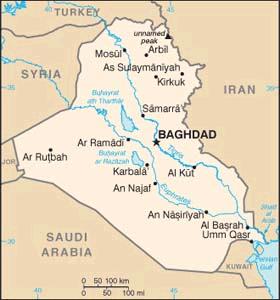 Bergner said that the trajectory of the country has already changed. From January to today, the amount of sectarian violence has dropped. It has not been a straight drop, and in May it rose over April. "That is the nature of progress here in Iraq. It is non-linear. It's definitely uneven, so you're going to see those interruptions, corrections," he said. Bergner said that the trajectory of the country has already changed. From January to today, the amount of sectarian violence has dropped. It has not been a straight drop, and in May it rose over April. "That is the nature of progress here in Iraq. It is non-linear. It's definitely uneven, so you're going to see those interruptions, corrections," he said.
The final parts of the surge are moving in to position. "We really don't want to let expectations and assessments get out in front of the force that's still flowing," he said. "The fifth brigade is significant increase in our capability. It's going to create new opportunities for us, and so where we've been up til now is less interesting than where we're going to go." The bottom line for servicemembers is that the battle for Baghdad is going to be a tough fight, Bergner said. "We've seen the courage of the Iraqi people as they stand up to al Qaeda," he said. "The coalition forces have more troops going to more places, making more contacts, and we are contesting places we haven't been for some time. "It's going to get harder before it gets easier." Subscription e-mail from the U.S. Department of Defense news service
Subscription required:
American Forces Press Service ~ Jim Garamone ** Iraqi People Taking Stand Against Al Qaeda
Posted by yaahoo_
at 12:01 AM EDT
Wednesday, 6 June 2007
Troops capture insurgents
Mood:
 celebratory
Topic: News celebratory
Topic: News
Troops disrupt operations, capture insurgents
BAGHDAD -- Coalition forces detained a number of suspects and uncovered an enemy mortar system in Iraq during operations that ended Tuesday. A local citizen tipped Multi-National Division-Baghdad Soldiers to uncover a 60mm mortar system in Sadr City Sunday. The local approached paratroopers from 82nd Airborne Division’s 325th Airborne Infantry regiment and told them the location of a mortar system he discovered in the back of a truck. “We suspect this mortar system was used in attacks on Coalition outposts, based on the location and point of origin site in which it was found,” said U.S. Army Lt. Col. David Oclander, the executive officer for the unit’s 2nd Brigade Combat Team. “Risking his own personal security, this man took action to get weapons used by criminal militias off the streets,” Oclander said. “(This is) a great example of how Iraqi citizens are working to take action in securing their neighborhoods.”  Coalition forces conducted several other operations across Iraq. Coalition forces conducted several other operations across Iraq.
In raids targeting al-Qaeda Tuesday morning, Coalition forces detained 18 suspected terrorists by using intelligence based off information gained from previous successful operations. Coalition forces also raided four buildings associated with al-Qaeda northwest of Fallujah, rounding up an additional 13 suspected terrorists. Military officials said the suspects have ties to a cell, which carries out car-bomb, sniper and mortar attacks against Coalition forces and Iraqi civilians. In Mosul Tuesday, Coalition forces raided two buildings and detained two suspected terrorists, including an assistant to a senior terrorist leader who was captured May 29. Coalition forces also captured suspected key al-Qaeda leaders in Rustafa, Taji and Termiyah, Tuesday morning. “Our continuing operations are frustrating al-Qaeda in Iraq’s ability to operate,” said U.S. Army Lt. Col. Christopher Garver, a Multi-National Force-Iraq spokesman. “We are targeting them, detaining them, and in turn [they] are giving us information to disrupt the networks further.”  Coalition forces nabbed four suspected terrorists, including one suspected terror cell leader during raids in northeast Baghdad. Coalition forces nabbed four suspected terrorists, including one suspected terror cell leader during raids in northeast Baghdad.
Military officials said the suspects are members of a secret terror cell responsible for moving explosively formed penetrators and other weapons to Iraq. The cell is believed to bring militants from Iraq to Iran for terrorist training. “Coalition forces continue to break apart the terrorist networks that attempt to bring instability to Iraq and inflict continued violence on the Iraqi people,” Garver said. The work of Iraqi citizens and Coalition troops has led to multiple arrests and the seizing of several weapons caches, disrupting operations and creating a safer environment for the people of Iraq. (Compiled from Multi-National Force-Iraq and Multi-National Corps-Iraq news releases) In other developments throughout Iraq:
• Coalition forces detained 18 suspected terrorists in raids targeting the al-Qaeda in Iraq network Tuesday morning based on information gained from previous successful operations. • Coalition and Iraqi forces captured a wanted insurgent during combat operations near the Karkh Oil Facility, northeast of Lutifiyah, Iraq June 1. Multi-National Force - Iraq ** Troops disrupt operations, capture insurgents
Posted by yaahoo_
at 7:02 PM EDT
Updated: Wednesday, 6 June 2007 7:05 PM EDT
Saturday, 2 June 2007
Sunni revolt
Mood:
 energetic
Topic: News energetic
Topic: News
More bad news for the lame-stream media, Demented-crats and libtards... Sunni revolt against al-Qaida spreads 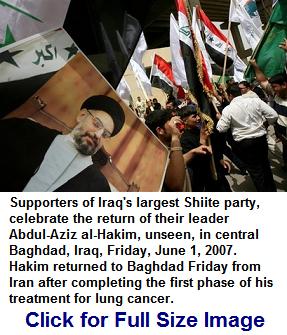 AP Photo >>> AP Photo >>>
BAGHDAD -- An al-Qaida-linked suicide bomber struck a safehouse occupied by an insurgent group that has turned against the terror network. Friday's attack northeast of Baghdad killed two other militants, police said, the latest sign that an internal Sunni power struggle is spreading. The U.S. military also announced the deaths of five more servicemen. At least 126 American troops were killed in Iraq in May, the third-deadliest month for U.S. forces since the war began more than four years ago. May was also the third-deadliest for Iraqis since The Associated Press began tracking civilian casualties in April 2005. At least 2,155 Iraqis were killed last month, according to the AP count. The Iraqi government put the number at 2,123, according to officials at the Interior Ministry, who spoke on condition of anonymity because they were not authorized to release the information.  The explosion in Baqouba came as Iraqi and U.S. troops fanned out in the Sunni stronghold of Amariyah in the capital, enforcing an indefinite curfew after heavily armed residents clashed with al-Qaida in Iraq fighters, apparently fed up with the group's brutal tactics. The explosion in Baqouba came as Iraqi and U.S. troops fanned out in the Sunni stronghold of Amariyah in the capital, enforcing an indefinite curfew after heavily armed residents clashed with al-Qaida in Iraq fighters, apparently fed up with the group's brutal tactics.
"Al-Qaida fighters and leaders have completely destroyed Amariyah," said Abu Ahmed, a 40-year-old Sunni father of four who said he joined in the clashes. "No one can venture out, and all the businesses are closed. They kill everyone who criticizes them and is against their acts even if they are Sunnis." Other residents, who spoke on condition of anonymity because they feared retribution, said the clashes began after al-Qaida militants abducted and tortured Sunnis from the area. That prompted a large number of residents, including many members of the rival Islamic Army armed with guns and rocket-propelled grenades, to rise up against the terror network. U.S. forces joined them in the fighting Wednesday and Thursday. 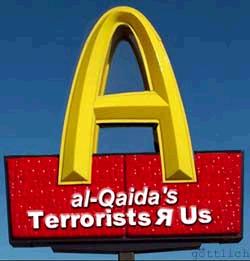 Ahmed denied being a member of any insurgent group but said he sympathizes with "honest Iraqi resistance," referring to those opposed both to U.S.-led efforts in Iraq and to the brutal tactics of al-Qaida. Ahmed denied being a member of any insurgent group but said he sympathizes with "honest Iraqi resistance," referring to those opposed both to U.S.-led efforts in Iraq and to the brutal tactics of al-Qaida.
With the insurgency appearing increasingly fragmented, Iraqi officials congratulated Amariyah residents for confronting al-Qaida. "Government security forces are now in control of the Amariyah district," Iraqi military spokesman Qassim al-Moussawi was quoted as saying by Iraqi state TV. He also lauded "the cooperation of local residents with the government." U.S. and Iraqi officials have claimed recent success in the effort to isolate al-Qaida, particularly in the western Anbar province, where many Sunni tribes have banded together to fight the terror network. A growing number of Sunni tribes have reportedly been turning against al-Qaida elsewhere as well, repelled by the terror network's sheer brutality and austere religious extremism. 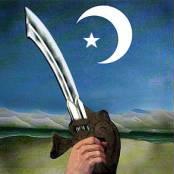 The extremists also are competing with nationalist groups for influence and control over diminishing territory in the face of U.S. assaults, a situation exacerbated by the influx of Sunni fighters to areas outside the capital as they flee a nearly four-month-old security crackdown. The extremists also are competing with nationalist groups for influence and control over diminishing territory in the face of U.S. assaults, a situation exacerbated by the influx of Sunni fighters to areas outside the capital as they flee a nearly four-month-old security crackdown.
But the clashes in Amariyah appeared to be the fiercest fighting between Sunni groups in the capital. "I think this is happening because of al-Qaida's brutality," said Ehsan Ahrari, professor and specialist in counterterrorism at the Asia-Pacific Center for Security Studies. "They have been hurting the Sunni population in Iraq and that is coming back to hurt al-Qaida." "The event itself is significant because it looks like the U.S. is making some breakthrough in terms of establishing consensus with the Sunni population," he said. "Of course we have to hold our breath and see, but this is important no doubt."  Official casualty figures from the fighting in Amariyah were not available. But a local council member, who declined to be identified because of security concerns, said at least 31 people, including six al-Qaida militants, were killed and 45 other fighters were detained in the clashes. The council member also said an indefinite curfew was imposed starting at 6 a.m. on Friday, confining people to their houses. Official casualty figures from the fighting in Amariyah were not available. But a local council member, who declined to be identified because of security concerns, said at least 31 people, including six al-Qaida militants, were killed and 45 other fighters were detained in the clashes. The council member also said an indefinite curfew was imposed starting at 6 a.m. on Friday, confining people to their houses.
The explosion in Baqouba, 35 miles northeast of Baghdad, came as residents said al-Qaida was trying to regain control of the central Tahrir neighborhood from the 1920 Revolution Brigades, a group composed of officials and soldiers from the ousted regime who have allied themselves with local security forces against the terror network. Local police said at least two members of the rival insurgent group were killed. The bomber was affiliated with al-Qaida in Iraq, according to police who would not be named because they feared they would be targeted.  Separately, the U.S. military announced that coalition forces killed six militants and detained 18 others in operations targeting al-Qaida in Iraq on Thursday and Friday. Separately, the U.S. military announced that coalition forces killed six militants and detained 18 others in operations targeting al-Qaida in Iraq on Thursday and Friday.
Three children, ages 7, 9 and 11, were also killed Friday during a U.S. attack on suspected militants trying to plant roadside bombs in Anbar province, the military said. Nationwide, at least 32 Iraqis were killed or found dead on Friday, including 15 bullet-riddled bodies that turned up on the streets of Baghdad, apparent victims of so-called sectarian death squads usually run by Shiite militias. The deadliest months in the past two years were December 2006, when at least 2,309 were killed, and November 2006, when at least 2,250 were killed.  The number of bodies found — usually attributed to sectarian death squads — dipped slightly in February 2007, immediately after the Baghdad security crackdown began Feb. 14, but has been steadily increasing in recent weeks. Since April 1, at least 1,974 bodies have been found across Iraq. At least 1,186 of these were found inside Baghdad, and 788 outside the capital. The number of bodies found — usually attributed to sectarian death squads — dipped slightly in February 2007, immediately after the Baghdad security crackdown began Feb. 14, but has been steadily increasing in recent weeks. Since April 1, at least 1,974 bodies have been found across Iraq. At least 1,186 of these were found inside Baghdad, and 788 outside the capital.
Meanwhile, the U.S. military announced that three American soldiers were killed by small-arms fire in Baghdad over the past three days. Another soldier died Thursday at a hospital in Maryland, two weeks after he was seriously wounded by a sniper while searching for American troops captured by al-Qaida-linked militants south of Baghdad. 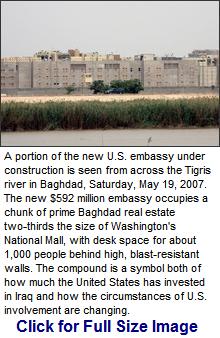 The military also announced the death of a soldier from wounds suffered in a roadside bombing in Baghdad on Wednesday. The military also announced the death of a soldier from wounds suffered in a roadside bombing in Baghdad on Wednesday.
Meanwhile, Abdul-Aziz al-Hakim, the leader of Iraq's largest Shiite party, returned to Baghdad from Iran after completing the first phase of his treatment for lung cancer, according to the Web site of the Supreme Islamic Council of Iraq. Separately, the State Department said the publication of computer-generated projections for the new U.S. Embassy under construction in Baghdad on an architecture firm's Web site would be a factor in future security considerations but would not affect the operation as a whole. "Obviously, the fact that some of this material has been out in the public domain is something our security folks will have to take into consideration as they move forward with construction and occupancy of the facility. But it hasn't in any fundamental way altered our plans," State Department spokesman Tom Casey said in Washington. AP writers Sinan Salaheddin and Bushra Juhi in Baghdad and AP's News Research Center in New York contributed to this report.
Yahoo News ~ Associated Press - Kim Gamel ** Sunni revolt against al-Qaida spreads
Related: This Blog *** Surge improves security, quality of life in Baghdad
Washington Post ~ Associated Press - Anne Gearan ** U.S. Embassy in Iraq to Be Biggest Ever
Posted by yaahoo_
at 3:39 PM EDT
Updated: Wednesday, 6 June 2007 6:36 PM EDT
Surge
Mood:
 bright
Topic: News bright
Topic: News
We better put the Demented-crats on suicide watch... Surge improves security, quality of life in Baghdad By Master Sgt. Dave Larsen
1st Cavalry Division Public Affairs CAMP LIBERTY -- The surge of Coalition and Iraqi Security Forces into Baghdad neighborhoods is aimed at improving the security situation in the Iraqi capital. Yet, there are other programs benefiting by having more boots on the ground during Operation Fardh Al-Qanoon. “The surge has assisted civil military operations by putting more coalition eyes on the environment, so that we get a more responsive analysis of what essential services and economic development services are needed by the populace,” said Lt. Col. John Rudolph, the assistant chief of staff of civil military operations for Multi-National Division – Baghdad. Rudolph said civil military operations in MND-B’s area of operation, which run the gamut from governance to agriculture to infrastructure to economic improvements, have already dedicated more than $163 million of Commander’s Emergency Relief Project (CERP) funds to projects all aimed at improving the quality of life for Iraqis living in and around Baghdad. “This really is about improving the quality of life for the Iraqis,” said Brig. Gen. Vincent K. Brooks, the deputy commanding general for support with MND-B. That “support” role not only touches the lives of the 50,000-plus troops working under MND-B, but also the Iraqi people. He said it’s challenging to move ahead with quality of life initiatives in the face of extremist efforts to stop them. “There is a perception that I’ve seen in every sector of this region we have responsibility for - when I talk to the Iraqis - that the Americans have the ability to put a man on the moon, and yet they can’t provide us with electricity,” Brooks said. “That whole idea of an expectation that we promised and haven’t delivered causes a great deal of problems.” Most westerners and Americans, for sure, cannot conceive flicking on a light switch on the wall and having it click with no effect. But, Baghdad has never had electricity flowing to its six million residents 24 hours a day. Electricity, or the lack thereof, was also tool used by the Ba’athist regime to reward or punish the population. “You saw areas favored by Saddam and his regime see power longer throughout the day, but they still didn’t get power 24/7,” Rudolph said. “They still had to use what they called the ‘generator men,’ who were entrepreneurs who had their own generators and supplied power to local neighborhoods for the ‘off power’ periods - even during Saddam’s period.” Rudolph said that providing power to Baghdad residents remains a priority, as witnessed by the 62 projects accounting for more than a quarter of the civil military operations funds dedicated this year – more than $44 million. The challenge to get the lights on throughout the Iraqi capital remains an ongoing issue. "It was an inefficient system to begin with and what we have done is by our electrification projects, in general, we’ve improved distribution so that the power that comes in is distributed more efficiently,” Rudolph said. “However, the level of available power goes down. It goes out to more places, but it doesn’t last as long.” Brooks said the provision of power to Baghdad neighborhoods remains a function of governance, and it will be the Iraqi government that will need to illuminate the Iraqi capital. “Our effort here has to be more than a physical one - to not only find ways to improve those systems physically, but also have to work back through that governance effort to ensure that people who are in positions of responsibility in government are not sectarian and are not biased in the delivery of essential services to all people,” Brooks noted. 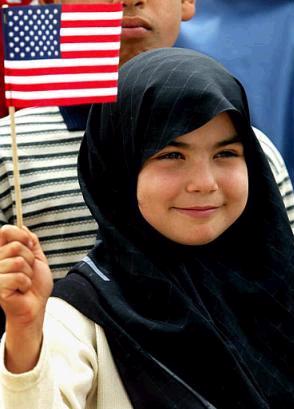 Improved security in some areas of the city has allowed life to flourish for some Baghdad residents. Temporary barriers erected throughout the city have created what military officials call “safe markets” and “safe neighborhoods.” Rudolph said the market areas have benefited from the temporary barriers, keeping suicide car bombers at bay while allowing commerce to continue. Improved security in some areas of the city has allowed life to flourish for some Baghdad residents. Temporary barriers erected throughout the city have created what military officials call “safe markets” and “safe neighborhoods.” Rudolph said the market areas have benefited from the temporary barriers, keeping suicide car bombers at bay while allowing commerce to continue.
The marketplace in the Rusafa District in what is known as “Old Baghdad,” on the east side of the Tigris River, is one of those success stories. “Shoppers feel much safer going into the market now and they’ve actually seen an increase in the number of local citizens using that market,” Rudolph said. “It’s a perception, an attitude that the stigma of the random violence has lessened.” The Doura Market is often a stop for visiting dignitaries to Baghdad in the southern Rashid District. The 1st Cavalry Division’s 2nd “Black Jack” Brigade Combat Team from Fort Hood, Texas, conducted the initial assessment of the area and started the revitalization project there. Doura Market, Rudolph said, went from an unorganized street market of only a few dozen vendors to a thriving market place with more than 200 sellers now. He said the 4th Brigade Combat Team, 1st Infantry Division from Fort Riley, Kan., now operates in Rashid, and even more improvements are underway. 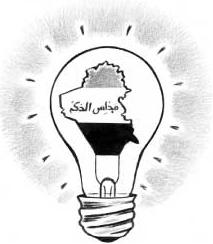 “4-1st Infantry is following up in their footsteps with a barrier plan just like Rusafa,” Rudolph said. “The shoppers (there) feel much safer in that environment. They’ve got solar-powered lights to provide security in the area. They have host nation security forces doing random patrols of the area, and because of these security measures more shops have opened up.” “4-1st Infantry is following up in their footsteps with a barrier plan just like Rusafa,” Rudolph said. “The shoppers (there) feel much safer in that environment. They’ve got solar-powered lights to provide security in the area. They have host nation security forces doing random patrols of the area, and because of these security measures more shops have opened up.”
Haifa Street, in the city’s center, west of the Tigris River, was once known as a hot-bed of extremist activity. It was a battleground for the 1st Cavalry Division when they operated in Baghdad in 2004-2005, and again earlier this year. The battleground is now a model neighborhood. “We’ve turned that around,” Brooks said. “Now, we have a thriving market area that is starting to grow and a revitalization process that will make the Iraqis really proud and recognize that things have improved.” All things start with security, Brooks said, but quality of life initiatives have been brought to life in areas of the Iraqi capital where the neighborhood and district advisory councils have worked in harmony for the good of their constituents.  “It’s where people in the neighborhood, people in the district recognize that they have needs and they’re the ones who should represent the people in that area,” Brooks said. “Mansour has a very active district council that is functioning very, very well, and our recent security operations have enhanced that, so they feel more and more secure. “It’s where people in the neighborhood, people in the district recognize that they have needs and they’re the ones who should represent the people in that area,” Brooks said. “Mansour has a very active district council that is functioning very, very well, and our recent security operations have enhanced that, so they feel more and more secure.
“They still remain periodically threatened, though,” Brooks said. “You have to recognize that people who are performing well, especially in harmony, are often targeted by extremists who don’t want to see good governance to ever form here.” CERP funds are a “band-aid,” Rudolph said. They are a way for coalition forces to provide immediate aid where needed. But MND-B, in conjunction with the State Department, is looking at long-term solutions to many of the issues facing the residents of the Iraqi capital.  “They use training programs for business practices and they also do micro-grants and micro-loans, but those are ‘payments in kind,’ Rudolph explained. “If a business needed, say, a cash register to be able to transact business activities, they wouldn’t get the money to buy it. They would get a cash register. It’s the items they would need, not the cash. As much as security has improved, we still don’t want cash-flow going into the hands of the wrong parties. That’s the best means of addressing it.” “They use training programs for business practices and they also do micro-grants and micro-loans, but those are ‘payments in kind,’ Rudolph explained. “If a business needed, say, a cash register to be able to transact business activities, they wouldn’t get the money to buy it. They would get a cash register. It’s the items they would need, not the cash. As much as security has improved, we still don’t want cash-flow going into the hands of the wrong parties. That’s the best means of addressing it.”
Brooks said MND-B has shifted its focus to long-term investments, versus short-term “band-aids” over the past three months.  “There’s been progress, but the approach that has been taken over the last several years for divisions like the 1st Cavalry Division was to find problems and fix them, and do it quickly,” Brooks said. “We’ve had success in that. But the reality is that it doesn’t leave an enduring systemic effect; so we’ve shifted our focus here over the last three months to look at the holistic system sewage on the west side of the river, for example, and identifying where the pump stations are, where the lift stations are, where the pipes that may be broken are, where there is standing sewage. Then, applying the resources, within the city of Baghdad and the government of Iraq, where they really matter.” “There’s been progress, but the approach that has been taken over the last several years for divisions like the 1st Cavalry Division was to find problems and fix them, and do it quickly,” Brooks said. “We’ve had success in that. But the reality is that it doesn’t leave an enduring systemic effect; so we’ve shifted our focus here over the last three months to look at the holistic system sewage on the west side of the river, for example, and identifying where the pump stations are, where the lift stations are, where the pipes that may be broken are, where there is standing sewage. Then, applying the resources, within the city of Baghdad and the government of Iraq, where they really matter.”
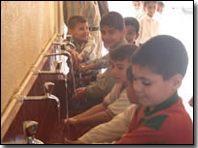 By looking at the broader picture, and engaging the local, district and provincial governments, Brooks said long-term progress is possible. By looking at the broader picture, and engaging the local, district and provincial governments, Brooks said long-term progress is possible.
“What’s changed, I think over that last few years, is how much the larger infrastructure has been revitalized,” Brooks said. “Water pipes have been replaced, electrical transformers have been installed, but it’s that last 100 meters worth of the service that really still has to become focused. Then people will really recognize a difference.” While on one hand, extremist elements are attempting to create chaos in the city streets and deter progress and quality of life initiatives, Brooks pointed in the other direction, to the American Soldier, and attributes much of the progress made to date in the Iraqi capital to the dedication of troops putting their boots on the ground to interact with residents and local officials.  “We wouldn’t have any of these successes; we’d have no progress if it weren’t for the contributions of our troops who are out there,” Brooks said. “We ask an awful lot of our Soldiers who are deployed over here. Certainly, we know we put them into harm’s way to accomplish whatever mission we set out to do. But their energy, their passion, their willingness to keep trying in the face of deliberate set backs at the hands of the enemy or at the hands of sometimes the Iraqis themselves - they’re out there every day and they keep moving forward. “We wouldn’t have any of these successes; we’d have no progress if it weren’t for the contributions of our troops who are out there,” Brooks said. “We ask an awful lot of our Soldiers who are deployed over here. Certainly, we know we put them into harm’s way to accomplish whatever mission we set out to do. But their energy, their passion, their willingness to keep trying in the face of deliberate set backs at the hands of the enemy or at the hands of sometimes the Iraqis themselves - they’re out there every day and they keep moving forward.
“In all these areas, not only security, but in governance, it may be that the first, best way for people to come together is because an American Soldier encouraged a district council member to sit in the same room with another,” Brooks added. “And governance begins, then, with the passion and the heart of the Soldier in this country.” Multi-National Force - Iraq ~ Master Sgt. Dave Larsen ** Surge improves security, quality of life in Baghdad
Related:
Multi-National Force - Iraq ~ Spc. Amanda Morrissey ** U.S. Soldiers, Iraqis open wells in Ninevah Multi-National Force - Iraq ~ Staff Sgt. Jacob Boyer ** Senior leaders gather to help rebuild Iraqi NCO Corps This Blog *** Sunni revolt against al-Qaida spreads
Press Releases:
Let's wait and see how long it takes for this headline to reach the front page of the NY Times or the Washington Post. I'll be watching the sky for pigs flying, and checking the Weather Channel for snow flurries in Hell. What does this guy know? He's actually there. We need libtards in New York and Washington to tell us this isn't working, as usual.
Posted by yaahoo_
at 2:12 PM EDT
Updated: Wednesday, 6 June 2007 6:38 PM EDT
Saturday, 26 May 2007
Al Suleikh
Mood:
 sharp
Topic: News sharp
Topic: News
Iraqis Taking The Lead At Al Suleikh  Capt. James Peay was starting to feel like a third wheel. Capt. James Peay was starting to feel like a third wheel.
Peay, a battery commander with the 82nd Airborne Division from Nashville, Tenn., was accompanying Iraqi police chief Lt. Col. Ahmed Abdullah on a combined engagement patrol through the east Baghdad neighborhood of Suleikh. Whenever they stopped to speak with people on the street, Ahmed did most of the talking. Peay stood off to the side, listening as his interpreter translated. His comments were mostly limited to hellos, goodbyes, and thank-yous. This was Ahmed's show, and Peay was more than happy to give him the spotlight. It's not that he is shy, Peay said later, it's that, ultimately, stability in Iraq depends on the Iraqi security forces - and people like Lt. Col. Ahmed - taking the lead. 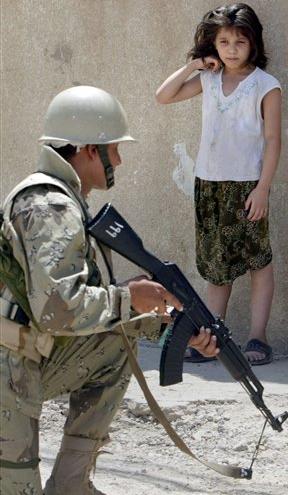 Successfully negotiating that difficult transition has become one of the major focuses of the entire war effort, especially since the kick-off of the new security plan for Baghdad, which has placed thousands of additional U.S. and Iraqi forces in Baghdad communities, often living together in the same compounds. Successfully negotiating that difficult transition has become one of the major focuses of the entire war effort, especially since the kick-off of the new security plan for Baghdad, which has placed thousands of additional U.S. and Iraqi forces in Baghdad communities, often living together in the same compounds.
Peay commands one of those new shared bases - the Suleikh Joint Security Station. For more than three months, paratroopers from the 82nd Airborne Division have been living and working side-by-side with the Iraqi police and Iraqi army at the JSS to coordinate security efforts in Suleikh. The paratroopers from Battery A, 2nd Battalion, 319th Airborne Field Artillery Regiment, man the JSS 24 hours a day. They have a cramped section of the building to themselves, stacked high with boxes of canned food, water and other supplies. The police stay on the other side of the same building, and the Iraqi soldiers stay in another part of the complex. At least once a day, liaisons from the three units meet in the conference room to discuss operations. When the JSS was first established, the area was so dangerous that the police rarely left the station. Some days, they went out only to pick up one of the dead bodies regularly dumped in the neighborhood.  Three months later, things changed. The U.S. presence helped bring the level of violence down significantly. At the same time, it emboldened the ISF to raise their profile in the area - particularly the police. Three months later, things changed. The U.S. presence helped bring the level of violence down significantly. At the same time, it emboldened the ISF to raise their profile in the area - particularly the police.
"They know we're here to support them, but at the same time, they're getting to a point where they know security as a whole is in their hands," said 2nd Lt. Jesse Bowman, an Alpha Battery platoon leader from Reynoldsburg, Ohio. The difficult part, now, will be to maintain the security while the U.S. forces step back and the ISF step up. Peay's patrol with Ahmed, May 18, his first as the new battery commander, gave an encouraging glimpse of the future. Before the patrol started, platoon sergeant, Sgt. 1st Class Michael Nichols, of Lewisburgh, W.V., went over tactics and procedures with the Iraqis. When he was satisfied everyone was on the same page, the patrol moved out. 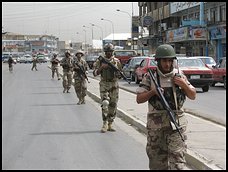 With a phalanx of police and paratroopers around them, Peay and Ahmed spent several hours walking a loop of the neighborhood around the JSS. They talked to people in their houses, outside washing their cars, on their way to work or anywhere else they found them. With a phalanx of police and paratroopers around them, Peay and Ahmed spent several hours walking a loop of the neighborhood around the JSS. They talked to people in their houses, outside washing their cars, on their way to work or anywhere else they found them.
Almost everyone complained about sewage or electricity, which, in the big scheme of things, Peay found promising.
"If they're complaining about the power, security must be pretty good," he said. Sometimes people came right out of their gates to talk with Ahmed in the middle of the street, an act that newly-arrived platoon leader, 1st Lt. Larry Rubal, from Old Forge, Pa., found incredible. At his old unit, people were afraid to be seen talking to U.S. or Iraqi security forces. 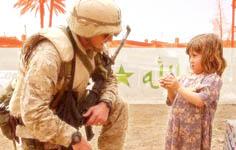 "I was very surprised by how willing people here were to come out and talk to us in the middle of the road," he said. "They were just very open." "I was very surprised by how willing people here were to come out and talk to us in the middle of the road," he said. "They were just very open."
Peay rarely had to ask a question. Ahmed was running the show. At one point Rubal asked his interpreter to make sure a man they were talking to received a pamphlet with the number of a crime tip line. The man produced one from his pocket. Ahmed had already given it to him. "You're too quick," Rubal said to Ahmed, laughing. Ahmed shrugged. 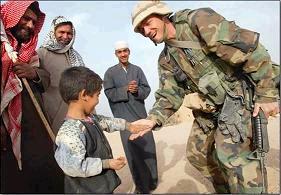 "He really took the lead and got out there," Peay said afterwards. "He really took the lead and got out there," Peay said afterwards.
Peay said he'd like to build on the day's success by conducting more joint patrols and joint operations. And whenever possible, he'll continue to keep the U.S. in the background.
"I'd rather our guys just stand outside and have (the ISF) do everything," he said. In the meantime, Peay has another patrol scheduled with Lt. Col. Ahmed. And as the ISF continue to make gains in securing the streets of Baghdad, it looks like Peay will have to get used to being the third wheel. Source: Multi-National Force-Iraq
NewsBlaze, Daily News ** Iraqis Taking The Lead At Al Suleikh
Posted by yaahoo_
at 2:09 AM EDT
Newer | Latest | Older
|
 PARIS -- The conservative party of French President Nicolas Sarkozy has won a clear parliamentary majority in elections. That's seen as crucial to his vision for opening up the French economy.
PARIS -- The conservative party of French President Nicolas Sarkozy has won a clear parliamentary majority in elections. That's seen as crucial to his vision for opening up the French economy.

 BAGHDAD, Iraq -- Coalition Forces killed a senior terrorist leader during an operation Tuesday morning targeting the al-Qaeda in Iraq network in Mosul.
BAGHDAD, Iraq -- Coalition Forces killed a senior terrorist leader during an operation Tuesday morning targeting the al-Qaeda in Iraq network in Mosul. WASHINGTON -- The
WASHINGTON -- The  For the year, revenue and spending are both at record levels. Revenue gains are up 8 percent while outlays are up at a slower pace of 2.5 percent, compared to the same period a year ago. Growth in spending has been slower this year in part because of the absence of last year's huge outlays for hurricane relief.
For the year, revenue and spending are both at record levels. Revenue gains are up 8 percent while outlays are up at a slower pace of 2.5 percent, compared to the same period a year ago. Growth in spending has been slower this year in part because of the absence of last year's huge outlays for hurricane relief. For the 2007 budget year, which ends on Sept. 30, the Congressional Budget Office is projecting a federal deficit of $177 billion. That would be down 28.7 percent from last year's imbalance of $248.2 billion, which had been the lowest deficit in four years.
For the 2007 budget year, which ends on Sept. 30, the Congressional Budget Office is projecting a federal deficit of $177 billion. That would be down 28.7 percent from last year's imbalance of $248.2 billion, which had been the lowest deficit in four years.
 Over all in the 2007 fiscal year, which ends at the end of this month, state spending in the 50 states totaled $616 billion, an increase of about 8.6 percent over 2006, according to a report by the National Governors Association and National Association of State Budget Officers. The average annual growth rate over the past three decades has been 6.5 percent, the report said.
Over all in the 2007 fiscal year, which ends at the end of this month, state spending in the 50 states totaled $616 billion, an increase of about 8.6 percent over 2006, according to a report by the National Governors Association and National Association of State Budget Officers. The average annual growth rate over the past three decades has been 6.5 percent, the report said. Utah lawmakers agreed to pay for the $1 billion bond act for roads with debt service paid out of the state’s general fund. “We have experienced significant growth here,” said John Massey, Utah’s legislative fiscal analyst. “So it is badly needed.”
Utah lawmakers agreed to pay for the $1 billion bond act for roads with debt service paid out of the state’s general fund. “We have experienced significant growth here,” said John Massey, Utah’s legislative fiscal analyst. “So it is badly needed.” Many states have also taken on the expensive and seemingly intractable problem of covering uninsured residents, particularly children. According to a report from the National Governors Association, two-thirds of the nation’s governors have plans to expand health care in their 2008 fiscal years, largely through expansions of government-financed health insurance programs and employer mandates.
Many states have also taken on the expensive and seemingly intractable problem of covering uninsured residents, particularly children. According to a report from the National Governors Association, two-thirds of the nation’s governors have plans to expand health care in their 2008 fiscal years, largely through expansions of government-financed health insurance programs and employer mandates. “The biggest agenda piece right now is to insure all kids in Oregon,” said Russ Kelley, the spokesman for Oregon’s House speaker, Jeff Merkley.
“The biggest agenda piece right now is to insure all kids in Oregon,” said Russ Kelley, the spokesman for Oregon’s House speaker, Jeff Merkley. In Oregon, where Democrats gained control of all of state government for the first time in 16 years, lawmakers passed legislation recognizing domestic partnerships, told insurance companies they had to pay for female as well as male contraception and are in the middle of passing bills restricting predatory lending.
In Oregon, where Democrats gained control of all of state government for the first time in 16 years, lawmakers passed legislation recognizing domestic partnerships, told insurance companies they had to pay for female as well as male contraception and are in the middle of passing bills restricting predatory lending.
 Gen. Mohammad Zahir Azimi, spokesman for the Defense Ministry, said officials could not say how many of the 30 reported casualties were killed or how many wounded. He said multiple sources were used to come up with the figure.
Gen. Mohammad Zahir Azimi, spokesman for the Defense Ministry, said officials could not say how many of the 30 reported casualties were killed or how many wounded. He said multiple sources were used to come up with the figure. Meanwhile, in eastern Afghanistan, U.S.-led coalition and Afghan troops killed "an enemy militant" during a firefight in Nangarhar province's Khogyani district, a coalition statement said.
Meanwhile, in eastern Afghanistan, U.S.-led coalition and Afghan troops killed "an enemy militant" during a firefight in Nangarhar province's Khogyani district, a coalition statement said. WASHINGTON -- The Iraqi people are taking a stand against al Qaeda beyond Anbar province, Multinational Force Iraq's new spokesman said today.
WASHINGTON -- The Iraqi people are taking a stand against al Qaeda beyond Anbar province, Multinational Force Iraq's new spokesman said today. Bergner said Iraqi government and coalition officials are encouraged by the trend.
Bergner said Iraqi government and coalition officials are encouraged by the trend. Bergner said that the trajectory of the country has already changed. From January to today, the amount of sectarian violence has dropped. It has not been a straight drop, and in May it rose over April. "That is the nature of progress here in Iraq. It is non-linear. It's definitely uneven, so you're going to see those interruptions, corrections," he said.
Bergner said that the trajectory of the country has already changed. From January to today, the amount of sectarian violence has dropped. It has not been a straight drop, and in May it rose over April. "That is the nature of progress here in Iraq. It is non-linear. It's definitely uneven, so you're going to see those interruptions, corrections," he said.
 Coalition forces nabbed four suspected terrorists, including one suspected terror cell leader during raids in northeast Baghdad.
Coalition forces nabbed four suspected terrorists, including one suspected terror cell leader during raids in northeast Baghdad.
 The explosion in Baqouba came as Iraqi and U.S. troops fanned out in the Sunni stronghold of Amariyah in the capital, enforcing an indefinite curfew after heavily armed residents clashed with al-Qaida in Iraq fighters, apparently fed up with the group's brutal tactics.
The explosion in Baqouba came as Iraqi and U.S. troops fanned out in the Sunni stronghold of Amariyah in the capital, enforcing an indefinite curfew after heavily armed residents clashed with al-Qaida in Iraq fighters, apparently fed up with the group's brutal tactics. Ahmed denied being a member of any insurgent group but said he sympathizes with "honest Iraqi resistance," referring to those opposed both to U.S.-led efforts in Iraq and to the brutal tactics of al-Qaida.
Ahmed denied being a member of any insurgent group but said he sympathizes with "honest Iraqi resistance," referring to those opposed both to U.S.-led efforts in Iraq and to the brutal tactics of al-Qaida. The extremists also are competing with nationalist groups for influence and control over diminishing territory in the face of U.S. assaults, a situation exacerbated by the influx of Sunni fighters to areas outside the capital as they flee a nearly four-month-old security crackdown.
The extremists also are competing with nationalist groups for influence and control over diminishing territory in the face of U.S. assaults, a situation exacerbated by the influx of Sunni fighters to areas outside the capital as they flee a nearly four-month-old security crackdown. Official casualty figures from the fighting in Amariyah were not available. But a local council member, who declined to be identified because of security concerns, said at least 31 people, including six al-Qaida militants, were killed and 45 other fighters were detained in the clashes. The council member also said an indefinite curfew was imposed starting at 6 a.m. on Friday, confining people to their houses.
Official casualty figures from the fighting in Amariyah were not available. But a local council member, who declined to be identified because of security concerns, said at least 31 people, including six al-Qaida militants, were killed and 45 other fighters were detained in the clashes. The council member also said an indefinite curfew was imposed starting at 6 a.m. on Friday, confining people to their houses. Separately, the U.S. military announced that coalition forces killed six militants and detained 18 others in operations targeting al-Qaida in Iraq on Thursday and Friday.
Separately, the U.S. military announced that coalition forces killed six militants and detained 18 others in operations targeting al-Qaida in Iraq on Thursday and Friday.  The number of bodies found — usually attributed to sectarian death squads — dipped slightly in February 2007, immediately after the Baghdad security crackdown began Feb. 14, but has been steadily increasing in recent weeks. Since April 1, at least 1,974 bodies have been found across Iraq. At least 1,186 of these were found inside Baghdad, and 788 outside the capital.
The number of bodies found — usually attributed to sectarian death squads — dipped slightly in February 2007, immediately after the Baghdad security crackdown began Feb. 14, but has been steadily increasing in recent weeks. Since April 1, at least 1,974 bodies have been found across Iraq. At least 1,186 of these were found inside Baghdad, and 788 outside the capital. 



 Improved security in some areas of the city has allowed life to flourish for some Baghdad residents. Temporary barriers erected throughout the city have created what military officials call “safe markets” and “safe neighborhoods.” Rudolph said the market areas have benefited from the temporary barriers, keeping suicide car bombers at bay while allowing commerce to continue.
Improved security in some areas of the city has allowed life to flourish for some Baghdad residents. Temporary barriers erected throughout the city have created what military officials call “safe markets” and “safe neighborhoods.” Rudolph said the market areas have benefited from the temporary barriers, keeping suicide car bombers at bay while allowing commerce to continue. “4-1st Infantry is following up in their footsteps with a barrier plan just like Rusafa,” Rudolph said. “The shoppers (there) feel much safer in that environment. They’ve got solar-powered lights to provide security in the area. They have host nation security forces doing random patrols of the area, and because of these security measures more shops have opened up.”
“4-1st Infantry is following up in their footsteps with a barrier plan just like Rusafa,” Rudolph said. “The shoppers (there) feel much safer in that environment. They’ve got solar-powered lights to provide security in the area. They have host nation security forces doing random patrols of the area, and because of these security measures more shops have opened up.” “It’s where people in the neighborhood, people in the district recognize that they have needs and they’re the ones who should represent the people in that area,” Brooks said. “Mansour has a very active district council that is functioning very, very well, and our recent security operations have enhanced that, so they feel more and more secure.
“It’s where people in the neighborhood, people in the district recognize that they have needs and they’re the ones who should represent the people in that area,” Brooks said. “Mansour has a very active district council that is functioning very, very well, and our recent security operations have enhanced that, so they feel more and more secure. “They use training programs for business practices and they also do micro-grants and micro-loans, but those are ‘payments in kind,’ Rudolph explained. “If a business needed, say, a cash register to be able to transact business activities, they wouldn’t get the money to buy it. They would get a cash register. It’s the items they would need, not the cash. As much as security has improved, we still don’t want cash-flow going into the hands of the wrong parties. That’s the best means of addressing it.”
“They use training programs for business practices and they also do micro-grants and micro-loans, but those are ‘payments in kind,’ Rudolph explained. “If a business needed, say, a cash register to be able to transact business activities, they wouldn’t get the money to buy it. They would get a cash register. It’s the items they would need, not the cash. As much as security has improved, we still don’t want cash-flow going into the hands of the wrong parties. That’s the best means of addressing it.” “There’s been progress, but the approach that has been taken over the last several years for divisions like the 1st Cavalry Division was to find problems and fix them, and do it quickly,” Brooks said. “We’ve had success in that. But the reality is that it doesn’t leave an enduring systemic effect; so we’ve shifted our focus here over the last three months to look at the holistic system sewage on the west side of the river, for example, and identifying where the pump stations are, where the lift stations are, where the pipes that may be broken are, where there is standing sewage. Then, applying the resources, within the city of Baghdad and the government of Iraq, where they really matter.”
“There’s been progress, but the approach that has been taken over the last several years for divisions like the 1st Cavalry Division was to find problems and fix them, and do it quickly,” Brooks said. “We’ve had success in that. But the reality is that it doesn’t leave an enduring systemic effect; so we’ve shifted our focus here over the last three months to look at the holistic system sewage on the west side of the river, for example, and identifying where the pump stations are, where the lift stations are, where the pipes that may be broken are, where there is standing sewage. Then, applying the resources, within the city of Baghdad and the government of Iraq, where they really matter.” By looking at the broader picture, and engaging the local, district and provincial governments, Brooks said long-term progress is possible.
By looking at the broader picture, and engaging the local, district and provincial governments, Brooks said long-term progress is possible.
 Capt. James Peay was starting to feel like a third wheel.
Capt. James Peay was starting to feel like a third wheel. Successfully negotiating that difficult transition has become one of the major focuses of the entire war effort, especially since the kick-off of the new security plan for Baghdad, which has placed thousands of additional U.S. and Iraqi forces in Baghdad communities, often living together in the same compounds.
Successfully negotiating that difficult transition has become one of the major focuses of the entire war effort, especially since the kick-off of the new security plan for Baghdad, which has placed thousands of additional U.S. and Iraqi forces in Baghdad communities, often living together in the same compounds. With a phalanx of police and paratroopers around them, Peay and Ahmed spent several hours walking a loop of the neighborhood around the JSS. They talked to people in their houses, outside washing their cars, on their way to work or anywhere else they found them.
With a phalanx of police and paratroopers around them, Peay and Ahmed spent several hours walking a loop of the neighborhood around the JSS. They talked to people in their houses, outside washing their cars, on their way to work or anywhere else they found them. "I was very surprised by how willing people here were to come out and talk to us in the middle of the road," he said. "They were just very open."
"I was very surprised by how willing people here were to come out and talk to us in the middle of the road," he said. "They were just very open." "He really took the lead and got out there," Peay said afterwards.
"He really took the lead and got out there," Peay said afterwards.